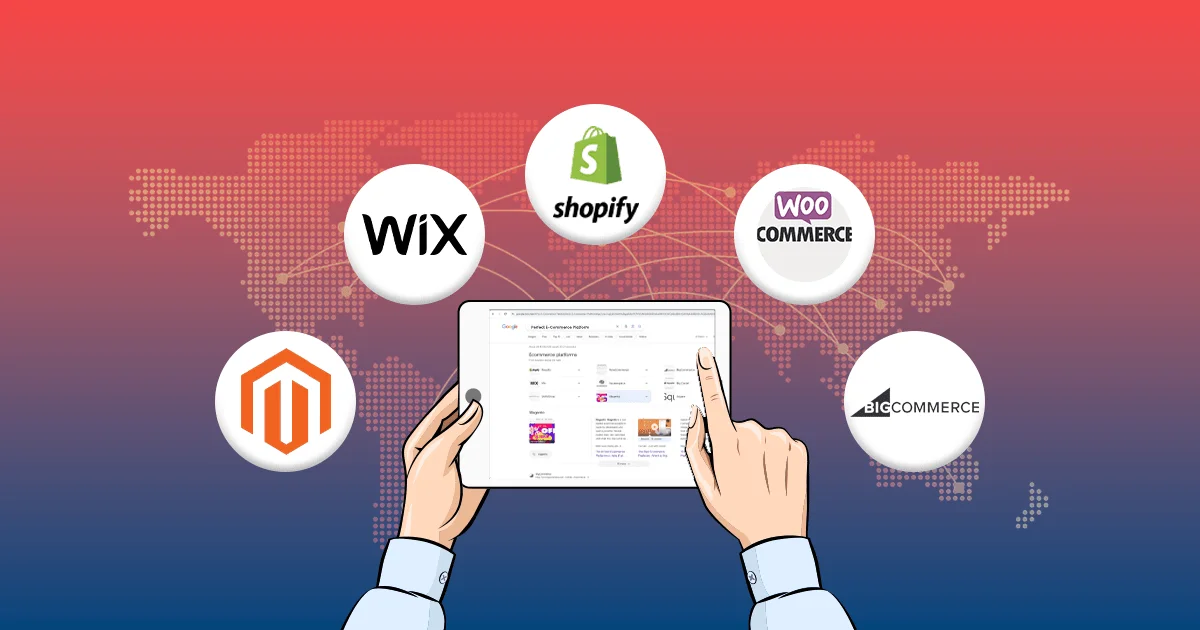In the post-COVID era, India has witnessed significant shifts in consumer buying patterns. Factors such as social distancing and convenience have led to a surge in online shopping. Since the conclusion of FY2020, e-commerce sales have skyrocketed by an impressive 140 percent, making it the most thriving industry in India. From essential services to leisure purchases, millennials and Gen Z are increasingly comfortable with online ordering. The gross merchandise value (GMV) of India’s e-tailers reached US$ 60 billion in FY2023.
These e-commerce platforms are built on various platforms, raising the question: which platform is best suited for building an e-commerce website? With numerous platforms available, some offering free trials and subscriptions, it can be challenging to determine the right fit for your business. To simplify this decision-making process, we are providing a comparison of various popular e-commerce platforms. helping you choose the one that aligns with your business requirements:
Absolutely, here’s the revised breakdown of popular e-commerce platforms with some statistics to help you choose:
1. WooCommerce (Open-Source Powerhouse)
Pros:
- Cost-Effective: Free plugin for WordPress, making it a budget-friendly option.
- Highly Customizable: Open-source nature allows for extensive customization and unique features.
- Scalability: Adapts to your business growth, from small stores to large online empires.
- WordPress Integration: Seamless integration if you already have a WordPress website.
- Statistics: Powers over 28.2% of online stores globally
Cons:
- Technical Expertise: Requires some technical knowledge for setup, maintenance, and security updates.
- Limited Out-of-the-Box Features: May need additional plugins to achieve the same functionality as Shopify offers natively.
- Transaction Fees: While WooCommerce itself doesn’t charge transaction fees, chosen payment gateways might.
2. Shopify (All-in-One Convenience):
Pros:
- Ease of Use: User-friendly interface with drag-and-drop features makes setting up your store a breeze.
- Built-in Features: Packed with essential functionalities like product management, inventory control, marketing tools, and payment processing.
- App Store: Extend functionalities with a vast app store offering solutions for various needs.
- Security and Updates: Shopify handles server maintenance, security updates, and data backups.
- Statistics: Over 5.6 million merchants use Shopify.
Cons:
- Limited Customization: Less control over core functionality compared to WooCommerce.
- Subscription Fees: Monthly subscription fees can add up as your business grows. There are also transaction fees depending on your plan.
- Vendor Lock-In: Switching platforms later can be complex due to data migration and design limitations.
3. BigCommerce (Enterprise-Grade E-Commerce):
Pros:
- Robust Features: Ideal for high-volume businesses with features like advanced product filtering, B2B functionalities, and robust APIs.
- Scalability: Handles large product catalogues and high traffic volumes efficiently.
- Security and Reliability: Strong focus on security and reliability for large-scale stores.
- Dedicated Support: Provides dedicated account managers and support for enterprise clients.
- Statistics: Used by major brands like Ben & Jerry’s and Skullcandy.
Cons:
- Higher Cost: Subscription fees are generally higher compared to Shopify and WooCommerce.
- Steeper Learning Curve: More complex interface might require a learning curve for new users.
- Overkill for Smaller Stores: May be overkill for small businesses with simpler needs.
4. Magento (Open-Source Powerhouse for Developers):
Pros:
- Ultimate Customization: Unmatched level of customization for developers to build highly complex stores.
- Scalability: Highly scalable solution for large-scale online businesses with demanding needs.
- Open-Source Platform: Free to use, offering complete control over the code and functionalities.
- Statistics: Used by major brands like Coca-Cola and Liverpool FC
Cons:
- Significant Technical Expertise: Requires substantial developer resources for setup, maintenance, and security.
- High Cost of Ownership: Hidden costs associated with development, hosting, and ongoing maintenance.
- Less User-Friendly: Not ideal for beginners due to its complex nature.
5. Wix Ecommerce (Beginner-Friendly Option):
Pros:
- User-Friendly: Drag-and-drop interface makes building a basic store very straightforward.
- Part of Wix Ecosystem: Integrates seamlessly with other Wix tools for website creation.
- Multiple Pricing Plans: Offers plans with varying features to suit different needs.
- Statistics: Wix reports having over 200 million registered users
Cons:
- Limited Customization: Less customization flexibility compared to other platforms.
- Scalability Concerns: Might not scale well for large stores with complex needs.
- Transaction Fees: Wix charges transaction fees in addition to their subscription plans.
- App Store Limitations: App store might not offer as many options as other platforms.
Choosing the right e-commerce platform can significantly impact customer experience and business revenues. But before diving in, what’s the crucial first step? Ensuring your business aligns perfectly with the chosen platform. Here are some key questions to consider before making your decision:
- Business Size and Growth Plans: Are you a startup, a medium-sized business, or aiming for a large-scale online empire? Consider your current needs and future aspirations.
- Technical Expertise: How comfortable are you with technical aspects like website setup, maintenance, and security updates?
- Budget: Factor in upfront costs (themes, plugins) and ongoing subscription fees.
- Features and Functionality: What functionalities are essential for your store (e.g., product management, inventory control, marketing tools)?
- Customization Needs: Do you require extensive customization of your store’s design and features, or are you comfortable with pre-built themes?
- Consider Scalability: Choose a platform that can adapt and grow alongside your business.
- Think About Security: Ensure the platform prioritises security features to protect your customer data and store information.
- Community and Support: Look for platforms with a strong community of users and readily available customer support.
Here Gr8 Brews is offering you a comprehensive guidebook of e-commerce platforms, much like your best friend providing essential notes before a crucial exam. However, if you still find managing it challenging, fret not! The best web designing and development agency in Kolkata is here to offer you end-to-end services. From stellar website design and development to post-launch maintenance, we’ve got all the assistance you need.
Getting Started is easy, connect with us for consultation.





